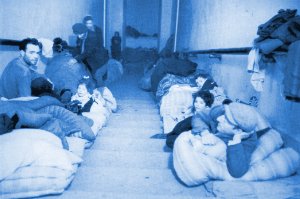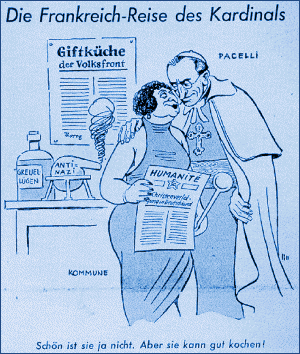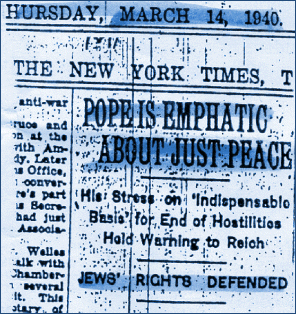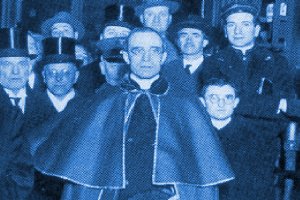

|
EDITOR'S NOTE: This past January 9th, I had the opportunity to meet with Ron Rychlak while he was in the Northwest for a speaking engagement. Ron is the author of "Hitler, the War and the Pope" and has been published in various journals on issues related to the role of Pope Pius XII before and during the Second World War. We talked about his research, his book and the current efforts to discredit not only Pius XII, but the Catholic Church as a whole. —PWM
SEATTLE CATHOLIC (SC): It seemed that a couple of years ago with several books published and a number of exchanges back and forth, the topic of Pope Pius XII and Nazi Germany was at the forefront of Catholic discussion. Since that time, the debate has somewhat died down. What recent developments have come up that you would consider to be of interest?
RON RYCHLAK (RR): I don't think it's necessarily died down as much as it's been eclipsed perhaps by the bigger scandal going on in the Church right know. There's been a series of books really that have come out — the most recent is Daniel Goldhagen's "A Moral Reckoning," but prior to that, James Carroll, John Cornwell has come out with a second book ("Breaking Faith"), Garry Wills has come out with two books (the most recent one "Why I Am a Catholic"), before that he had "Papal Sin." It doesn't seem like it's slowed down much at all. Maybe the newer books haven't drawn the attention that Cornwell's "Hitler's Pope" did, but the debate still seems to be raging, I think.
SC: Are you concerned at all that you may be "preaching to the choir" and that most people have already made up their minds on whether they are for or against the actions of Pius XII?
RR: Well, when it comes to the writers and the authors — once upon a time, I had the delusion that I would be able to persuade John Cornwell and the others to acknowledge the errors in their arguments.
SC: You presumed that once they were shown the light of truth, they'd be forced to admit their errors.
RR: I did, because I really think it's that obvious. I came to realize that it's probably not going to happen with them and there a lot of other people who have pretty much made up their minds because it's an issue most probably aren't going to read three books about. They'll read one and make up their mind. But, there are also a whole lot of people who haven't heard anything about it, or they've vaguely heard that there's this controversy, so when I go around like this and do these talks and show these slides, so they can see how photographs have been altered, how quotations have really been butchered, I show pictures of Jews being sheltered in Vatican property, things people said about Pius XII at the time of the war and beyond, I think a lot of people have their eyes opened.
SC: For those who aren't familiar with the general argument, it is proposed not that Pius XII made an honest diplomatic mistake that can be seen and debated in hindsight, but that his ideology or supposed latent "anti-Semitism" dictated his actions with regard to the Nazi persecution of the Jews, correct?
RR: Yes, that position is stated in several of the books. In terms of the charge of "anti-Semitism", thousands of Catholic priests died at Dachau. Pius XII treated that victimization the same way he treated Jewish peasants who were victimized. He thought that his was the right approach. Historians can debate about whether he was correct or not, but if "anti-Semitism" were really at the bottom of this, I think we would have seen him protesting to no end when a Catholic priest was killed, but being silent when it was a Jewish peasant. Then you'd have a case. But when he treats them the same, it says to me that he thought this was the most appropriate way to deal with the situation across the board.
When you really look at what he did, there were continual diplomatic protests, work through the nuncios, people being sheltered and fed and clothed in Church property — even in the Vatican itself. An "anti-Semite" wouldn't do that. I think Pius XII was concerned with a number of things. Traditionally, the Vatican is a neutral country which does not, in times of war, choose one side or another. He actually violated that and told Allied nations about Nazi troop movements, but he had that tradition to consider. He also felt, with very good cause based on the information presented to him, that for him to be more bold in his pronouncements would bring about retaliation against Catholics in occupied areas, and in Germany. For instance, one time he sent a statement to be read in every parish of a Polish archdiocese, and the archbishop sent it back saying they couldn't read this without getting people killed.
So Pius XII didn't use a "cookie cutter" approach from one country to the next. He relied upon his representatives to figure out what they could do given the circumstances of each particular nation. When the local clergy was outspoken, there were many letters from Rome congratulating and encouraging them. Conversely, when they were overly silent, there were some letters suggesting they take more active measures. Following the principle of subsidiarity, the specific steps to be taken at the lower levels were up to the local officials, but there was always papal encouragement.
 Jewish peasants hiding in Vatican property at Castel Gandolfo. |
RR: Goldhagen actually goes back to the New Testament and says that it is infested with "anti-Semitism". And basically he says that the Catholic Church is responsible for spreading "anti-Semitism" because it preached the New Testament. He says we need to go back and purge the New Testament of these "anti-Semitic" passages; we have to acknowledge that Christ is not the way to salvation; countries need to cease having diplomatic relations with the Vatican; the Church needs to pay reparations for the harm that was caused; and Catholics need to essentially apologize themselves out of existence. At that point, it's no longer an attack on Catholicism, but all of Christianity. In fact, last night at a talk in Portland, I met a professor who was a Lutheran and he mentioned that the Catholic Church was far more outspoken against the Nazis than the Protestants were, and I think he has a point. I think Goldhagen really chose a bad target because (as opposed to Protestants which vary in beliefs) the Catholic Church has a structure of defined beliefs, and a Magisterium which has always intended to bring Jews into the Faith and has opposed racially-motivated violence.
SC: What do you think is behind some of these efforts to malign Pope Pius XII?
RR: In terms of John Cornwell, Garry Wills and James Carroll, I think it's very clear and you don't have to go beyond their own writings to say that they want to change the Catholic Church. Cornwell's last chapter in "Hitler's Pope" and his entire new book is a criticism of the current Pope and how he's destroying the Church. That last chapter says that John Paul II is just like Pius XII and we can expect a similar result from his pontificate. Cornwell's new book says that if the next Pope isn't more of a liberal, the Catholic Church is going to be in serious trouble.
SC: Do you think that the wave of recent scandals that have come to light over the past year have predisposed people against the Church and made your efforts harder to present Pius XII as a virtuous individual?
RR: Absolutely. Last April, I was at a conference in Pennsylvania and James Carroll (who is a former priest and wrote "Constantine's Sword") was there, and his whole lecture was, "Pius XII ... Cardinal Law ... Pius XII ... Cardinal Law ... Pius XII ... Cardinal Law."
If you go back to the prior October [2001], I was at the Society of Catholic Social Scientists. There was a group of us around the table and I said that Pius XII is at the center of a broader attack upon the Catholic Church and a lot of people really didn't agree with me. Then in January, when Goldhagen's article hit the cover of the New Republic, I received a call from one of the men at the table who disagreed at the time but now said, "You were right. I didn't see it coming but obviously this is a larger attack." But by then, the sex abuse scandal had come up and that's largely a self-inflicted wound for which it's hard to make excuses. But now, a lot of the people are using that, in addition to Pius XII, for political purposes. With Goldhagen coming in with his book now, you have to recognize that the Catholic Church is being attacked from many angles. Some criticism may be fair but a whole lot of it is not — especially as it pertains to Pius XII.
SC: It would seem that the Catholic Church is the only Faith or culture that it's still acceptable or even expected to criticize.
RR: I think that's right. It's the last acceptable prejudice and part of that has to do with the Pope taking moral stances, defending life, speaking about morality. It's very hard in American society today for someone to say divorce is wrong, or contraception is wrong. Who's the one person in the world who's out there saying these things are wrong? The Pope, and the Catholic Church. That makes him and the Church both targets. If you look at the books, "Hitler's Pope" was about Pius XII tied to John Paul II, but the books that have come out since — "Papal Sin" by Garry Wills talks about all the Popes going back 150 years; "Constantine's Sword" by James Carroll goes back to the foundation of Christianity; Susan Zuccotti and David Kertzer both wrote books calling Pius XI an "anti-Semite", when other authors have used him as an example of a "good Pope" as opposed to Pius XII. They're spreading the charge across the board on all the Popes, because it's an attack on the Church and on the Papacy, not upon any individual person.
SC: How much do you think it matters who happened to be the Pope during the Second World War? Would we have seen the same result regardless?
RR: Yes, absolutely. If we want to play the game that if Pius XII or some other Pope had used the bully pulpit — because that's what Pius XII didn't do; he didn't use the bully pulpit. Let's play that scenario out — what happens? Several people have said things like "The impact of the statement would have lasted 24 hours and the Vatican would have lasted 30 minutes." "The Vatican would have been invaded." Maybe that's okay, but what would have happened to Catholics throughout Europe? Maybe Catholics should, and lots and lots did, put their lives on the line ... but should the Pope put their lives on the line for them? Some people have said, "yes, he should have," but I think Catholic teaching on this subject is pretty clear (and Pius XII himself said this) that martyrdom is a good thing but it cannot be imposed on someone else. You have to decide yourself to become a martyr.
Pius XII was not silent — he was speaking out and everybody knew it. Even John Paul II today doesn't single out individuals when he makes statements. People say his words are bold and courageous, but if you actually read them, they're not explicit. We know what he means because we understand the context of what he's saying. Similarly, during World War II, everyone understood the context of Pius XII's words and no one doubted where he stood.
SC: One of the more striking aspects of this controversy is the complete disparity between modern critics and the secular press, the Jewish leaders, and other observers at the time of the Second World War who were congratulating and thanking Pius XII. These people are now ignored or dismissed as naive.
RR: The most amazing thing, if you think about it is this: What do they say? They say "Those people didn't know!" Well, what didn't they know? "Pius XII was silent!" Wait a minute. If silence is the charge, then how could they have not have known at the time? Back then, they all thought Pius XII was pretty outspoken and bold. The New York Times said he was a "lonely voice out of the silence of a continent." It just doesn't work.
SC: It's not like they're saying the Pope did something wrong that wasn't discovered until later. They're trying to say that he didn't do something that everyone at the time knew he did.
 Nazi Propaganda: "The Cardinal's Journey to France" "She is certainly not pretty, but she can cook." |
SC: In search of a reconciliation of sorts, John Paul II has deemed it appropriate on occasion to put aside debates over past culpability and take what he considers to be the first step toward moving on by apologizing. Have you encountered any reaction from Catholics who think it may be better for you not to fight this fight and try to put it all behind us?
RR: I sometimes think that the American Bishops are sort of at that point with this matter — that it's not worth the fight. Maybe not so much the individual bishops but the staff of the bishops conference; I think they sometimes would prefer to just put this aside and not deal with it.
I think that's a mistake, first of all, because it's a simple matter of justice. I'm a law professor, not a historian or a theologian. I am Catholic, but my book is not particularly a defense of Catholicism. This book is about factually, what happened. I also think when we know what happened in that era, that brings Catholics and Jews closer together, not further apart. In many instances, they suffered together. Look at what people did and said at that time: the chief Rabbi of Rome [Zolli] converted to Catholicism after the war. It was not done in thanks (as some people have incorrectly said) but was a genuine conversion that happened over the course of a twelve year period. However, he did take the Christian name "Eugenio" which was Pius XII's name in thanks and tribute to the Pope. In 1955, the Israeli Philharmonic Orchestra (which still has concerns about playing Wagner) went to Vatican City to play a concert of thanks and had a picture taken with Pius XII. There were all sorts of tributes after the war, upon his death, etc.
With something as serious as this, we should be concerned with the truth of the matter. If the truth led us to say that the Pope was a bad guy, we should be willing to acknowledge it. But in this case, that is not the truth.
SC: You're a law professor by trade. How does your legal background affect how you approach this issue?
RR: Well, it's amazing how many lawyers have written me saying they really liked the book. I don't want to say I wrote it like a lawyer because I don't want to scare people away from reading the book, but in a way, that's how I approached it. In a trial, when you make an opening statement to the jury and take testimony, you're generally not allowed to argue. The judge wants to get the evidence out and then you have closing arguments in which you pull everything together to argue the case. The same was true for my book. For the first seventeen chapters, I tried to lay out the evidence and show factually what happened. You have to look at World War I and the factors which led to the origin of the Nazi party. You have to understand the career of Pius XII from his days as a nuncio in Germany to becoming Secretary of State, and the agreements reached between the Vatican and Germany. You have to understand the relationship between the Vatican and Italy, which in the 1870's had seized the papal states, then in the 1920's had reached an agreement which is very similar to the agreement the Church reached with Germany in 1933. You have to look at what happened in Germany as the Nazis were coming to power, both with regards to the Jewish people, but also the Church. Then you have to look at the war year by year, and finally, what it was like to be Pope after the war. And only then, in the eighteenth chapter, I take ten questions that I think are fundamental to understanding Pius XII: Was he an "anti-Semite"? Was he afraid of communism? Was he seduced by Hitler? ... these kinds of questions. And based upon the facts that were laid out in the earlier chapters, let's try to answer those questions. That, to me, is the only fair way to analyze an issue. To get the facts out, then argue based on those facts.
SC: You mentioned communism which was, at the time, firmly established in Russia and springing up in other parts of the world. How much of a factor do you think the threat of communism played in the decision-making of Pius XII?
RR: It's very clear that the Vatican and Pius XII were opposed to communism and would have done whatever possible to prevent it's expansion and growth from taking place. However, the real question is when Germany and the Soviet Union started fighting one another, did Pius XII side with Germany? I think the answer clearly is "no". There were people who thought he should bless Germany's crusade into the "Godless Soviet Union", and some underlings in fact gave such a blessing, and Pius XII made them retract it since it wasn't a Crusade and it wasn't God's army. He understood Hitler and the Nazis and understood these were very bad people.
What was his position between those two countries? It's hard to say. I think the most interesting statement is what Harry Truman said: "Let's find out who's losing and give them more weapons so they can keep killing each other." Pius XII wouldn't have said that, being Pope, but I think he perhaps recognized that two of the most evil entities on the face of the earth were fighting each other, and it's not a situation where you pull for one side or the other.
SC: When Pius IX was beatified recently, the circumstances involving the upbringing of Fr. Mortara caused something of a controversy. Do you see these current accusations adversely affecting efforts to beatify Pius XII?
  New York Times headlines acknowledging Papal efforts. |
They are convinced he led a life of heroic virtue; they just haven't finished writing the final chapters yet, although they're very close. They'll probably be done within a year. At that point, the question revolves around the necessary miracles. They did read my book very carefully before it went to press, so it very much reflects their position on Pius XII.
SC: What do you make of the controversy surrounding the release of previously sealed Vatican documents for investigation?
RR: The tradition for the Vatican was to keep documents sealed for 100 years; that has been cut down to 75 years, and the process moves papacy by papacy, not year by year. What they have to do is go through and archive all the documents from what's about to be released, which is the papacy of Pius XI going up to 1939. You have to archive them, you have to index them, you have to document them, so that things will not disappear, and also so that things will not be inserted into the archives. That's one reason for the delay, but the other traditional reasons are so that you don't embarrass someone who's alive, and so you don't give away state secrets. That policy is virtually universal; not just with the Vatican. Similar archives for the United States are not accessible.
However, in 1964, after this issue first arose, Paul VI commissioned four Jesuit priests to comb through these archives and find the documents of the Holy See relating to World War II. These documents were reproduced in eleven volumes (twelve books as the third volume is in two parts) with each volume the size of a big city phone book. I have a set in my basement. The documents include correspondence back and forth with the nuncios, the private notes of Montini, some letters from the Pope, correspondence with heads of state, etc. They have been published since about 1980 but they are still mostly in the original languages. Most of the documents are in Italian and German and are not accessible to the common researcher. Although it's a rare set and is in all these different languages, I think if you go through there, that reveals the story.
Now, the critics say, "Aha, but these are selected documents ... It's not everything ... It's not going to be fair until everybody gets into all the documents." Well, when the archives get opened, here is my prediction: in fact, I've already been told by people who work over there that Pius XII will look good and it will show even more Vatican involvement, but I know there's going to be a letter that was not responded to properly or someone requested something that didn't happen, and those things are bound to take place — they're humans. And so, there will be critics who will still say it supports their case, or go on to say that all the incriminating documents were secretly suppressed over the past fifty years, or anything else. So, I don't expect this to resolve the debate.
But I think there's enough in those eleven volumes currently available that any honest person would conclude that Pius XII cared; Pius XII tried to help; Pius XII was not an "anti-Semite"; Pius XII was not sympathetic to the Nazis. There's enough there to resolve that.
SC: How do you think Pius XII deserves to be remembered?
RR: I was just reading a book written in about 1954 by a New York Times reporter who was over in Europe during the war (this was before the controversy arose) and he was saying how he was certain that Pius XII would one day be recognized as "Pius the Great" — that he'd earn that title for all he'd done. A lot of people thought that of him at the time. I just think he should be remembered fairly. I think he was a good man who tried to do the right thing.
In 1954, he had a very serious medial condition and he died four years after that. Most people remember him from those last four years — very shallow, withdrawn, didn't say a lot, and pictured as being this silent, stoic figure. But this is someone who was a diplomat; he was considered a witty, brilliant conversationalist; he was well-informed. It would be nice if people remembered that aspect of him as well.


